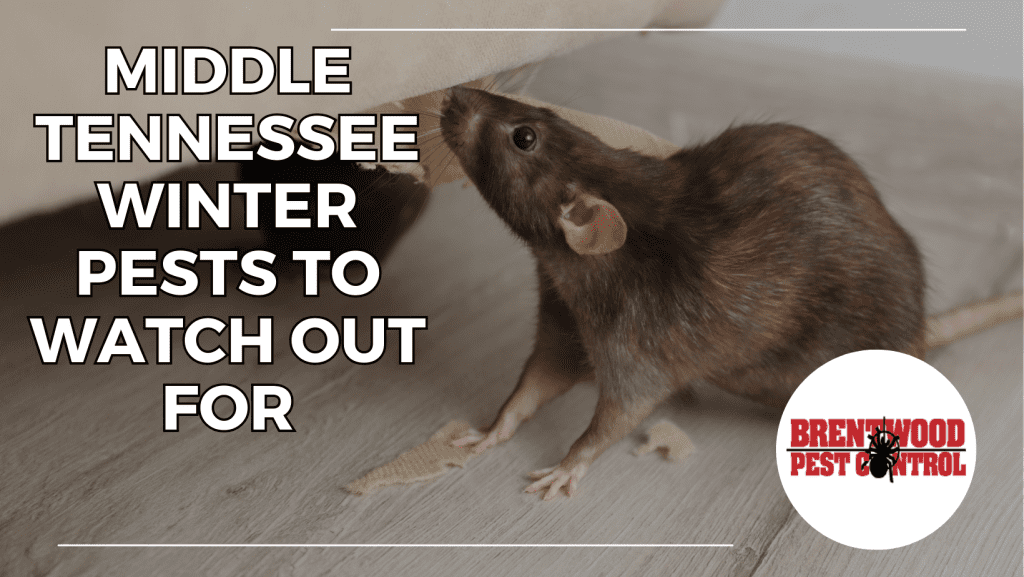
As winter sets in, the warm and cozy atmosphere of your home becomes an inviting haven—not just for your family but also for various pests seeking refuge from the cold. Middle Tennessee is no exception, with its chilly winters driving an array of pests indoors. At Brentwood Pest Control, we understand the challenges homeowners face during the colder months, and we’re here to help you protect your home and loved ones. Below, we highlight the most common winter pests in the area, the risks they pose, and effective strategies to keep them at bay.
1. Mice: Unwanted Winter Guests
Mice are one of the most common winter invaders. As temperatures drop, these rodents seek shelter in garages, basements, attics, and walls. Mice can squeeze through openings as small as a dime, making it easy for them to enter your home. Once inside, they chew on wood, insulation, and even electrical wiring, increasing the risk of fires. Additionally, mice contaminate food and surfaces with their urine and droppings, posing health risks.
Prevention Tips:
– Seal cracks and holes in walls, foundations, and around utility lines using caulk or steel wool.
– Store food in airtight, hard plastic containers.
– Keep your home free of clutter, especially in storage areas like basements and attics.
– Install weatherstripping around doors and windows to eliminate gaps.
2. Ants: Persistent and Resourceful
While ants are often associated with summer, some species, like odorous house ants, remain active during winter. They enter homes through tiny cracks in search of food and warmth, often forming trails to kitchens and pantries.
Prevention Tips:
– Repair foundation cracks with liquid cement.
– Keep counters and floors crumb-free and clean up spills immediately.
– Store sweet and starchy foods in sealed containers.
– Schedule a perimeter treatment with Brentwood Pest Control to stop ants before they get inside.
3. Spiders: Silent Creepers
Spiders are another common winter pest in Middle Tennessee. They enter homes seeking warmth and food, primarily preying on other insects. While most spiders are harmless, species like the brown recluse can pose a serious threat with venomous bites.
Prevention Tips:
– Keep external lights off to avoid attracting flying insects that spiders feed on.
– Seal gaps in siding, windows, and door frames.
– Remove clutter where spiders can hide, such as in closets, basements, and attics.
– Use sealed storage containers for clothes, shoes, and holiday decorations.
4. Cockroaches: Unsanitary Intruders
Cockroaches thrive in warm, moist environments, making kitchens and bathrooms prime targets during winter. German cockroaches, in particular, are notorious for spreading bacteria and worsening asthma and allergies, especially in children.
Prevention Tips:
– Regularly vacuum floors and clean under appliances.
– Take out the trash daily and store garbage in sealed containers.
– Inspect grocery bags, second-hand appliances, and storage boxes for signs of cockroaches before bringing them indoors.
– Repair leaky pipes and eliminate standing water to reduce moisture.
5. Wasps: Preparing for Spring
While wasps are less active during the winter, queens often overwinter in hidden spaces like attics, wall voids, or eaves. If undetected, they can establish new nests in the spring.
Prevention Tips:
– Inspect and seal entry points around your home, including vents and soffits.
– Remove any nests found during the fall.
– Trim tree branches and shrubs near your home to reduce access points.
6. Silverfish: Small but Persistent
Silverfish are tiny pests that thrive in cool, damp areas such as basements, garages, and bathrooms. They feed on paper, clothing, and food, potentially causing significant damage over time.
Prevention Tips:
– Use dehumidifiers to reduce moisture levels in your home.
– Store items like books, papers, and clothes in airtight containers.
– Seal cracks in foundations and walls to limit entry points.
7. Sowbugs: Moisture-Dependent Invaders
Sowbugs are crustaceans that require high humidity to survive, often entering homes through sliding doors or foundation gaps. While they pose no direct threat, they can be a nuisance when they invade in large numbers.
Prevention Tips:
– Keep basements and crawl spaces dry with proper ventilation.
– Repair damaged weatherstripping on doors and windows.
– Regularly clear leaves and debris near the foundation of your home.
Why Professional Pest Control Matters in Winter
While DIY measures can be effective, professional pest control ensures comprehensive protection. At Brentwood Pest Control, we offer customized pest management plans tailored to your home’s specific needs. Here’s what sets us apart:
– Expert Inspections: Our technicians thoroughly inspect your home to identify entry points and harborage areas.
– Integrated Pest Management (IPM): We use eco-friendly treatments that are safe for your family and pets while effectively targeting pests.
– Seasonal Maintenance Plans: Regular monitoring and treatments ensure your home remains pest-free throughout the year.
– Guaranteed Results: We stand behind our work and offer follow-up services if pests return.
Protect Your Home This Winter with Brentwood Pest Control
Don’t let pests ruin your winter comfort. With Brentwood Pest Control, you can enjoy a pest-free home all season long. Whether you’re dealing with rodents, ants, spiders, or any other unwelcome guests, our team of experts is here to help.
Visit our website for more information or call us at (615) 417-1243 to schedule an inspection. Let Brentwood Pest Control safeguard your home this winter and beyond!
